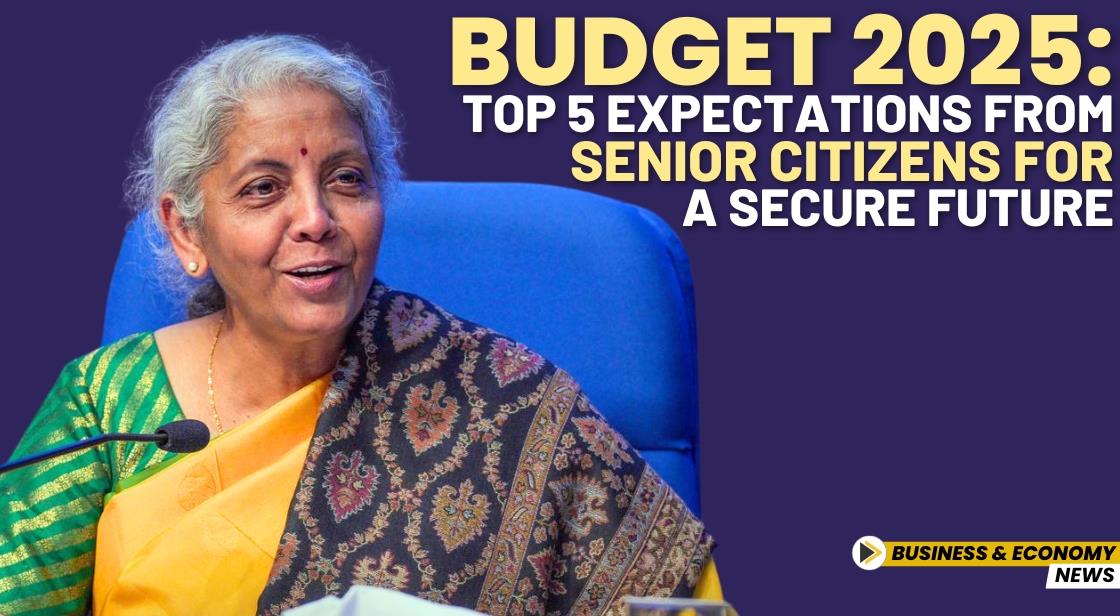Budget 2025: Top 5 Expectations from Senior Citizens for a Secure Future

News Synopsis
As the Union Budget 2025 nears, anticipation is growing among taxpayers, especially senior citizens, who face unique financial challenges in their golden years. While much of the focus tends to be on the salaried class and business owners, the elderly have distinct concerns such as rising medical expenses, inflationary pressures, and dwindling savings.
Addressing these issues in the upcoming budget could go a long way toward ensuring a dignified and financially secure life for India’s elderly population.
Let’s delve into the five key expectations senior citizens have from Budget 2025 and how these measures could bring relief to this demographic.
Key expectations senior citizens have from Budget 2025
1. Lowering the Age Threshold for Income Tax Exemptions
Senior citizens aged 75 and above currently enjoy exemptions from filing income-tax returns if their income comes solely from pensions and interest from specific banks.
-
Expectation: Reducing the age threshold for this exemption could significantly ease compliance for more seniors. Additionally, introducing simplified tax return forms for individuals with varied income sources would streamline the filing process and reduce stress.
-
Impact: This move would acknowledge the challenges seniors face in navigating complex tax systems, making financial management simpler for them.
2. Increased Tax Exemption Limits
The basic exemption limit for senior citizens has remained stagnant for several years, despite rising living costs.
-
Expectation: Increasing the exemption limits under the new tax regime would provide immediate financial relief and encourage more seniors to adopt the simplified tax framework.
-
Impact: Higher exemptions would not only improve cash flow but also ensure better financial security for senior citizens.
3. Adjusted TDS Thresholds on Interest Income
Currently, banks and financial institutions deduct Tax Deducted at Source (TDS) on interest income exceeding a specified threshold.
-
Expectation: Aligning the TDS threshold with the basic exemption limit would help minimize unnecessary deductions and reduce the need for filing refunds.
-
Impact: This adjustment would eliminate additional paperwork and allow seniors to retain a larger portion of their income, reducing financial strain.
4. Enhanced Benefits for Savings Schemes
Interest earned from senior citizens’ savings schemes and post-office savings accounts forms a significant part of the income for many elderly individuals.
-
Expectation: Increasing tax exemptions on these savings avenues would provide direct financial relief to seniors, helping them better manage their expenses.
-
Impact: Enhanced benefits would encourage more savings and ensure a steady income stream for the elderly population.
5. Better Deductions for Medical Costs
Healthcare remains a major expense for senior citizens, with rising costs often depleting their savings.
-
Expectation: Expanding deductions for health insurance premiums and out-of-pocket medical expenses would address these concerns effectively.
-
Impact: Such measures would provide seniors access to better healthcare without undue financial strain, ensuring their well-being.
Conclusion
The Union Budget 2025 provides a crucial opportunity for the government to address the unique financial challenges faced by senior citizens. Measures such as lowering the age threshold for tax exemptions, increasing basic exemption limits, and adjusting TDS thresholds on interest income can significantly ease their tax compliance burden.
Enhanced benefits for savings schemes and expanded deductions for medical expenses would directly improve their financial well-being and ensure better access to healthcare.
By implementing these targeted reforms, the government can acknowledge the contributions of senior citizens and empower them to lead a financially secure and dignified life. As India’s elderly population continues to grow, addressing their concerns is not just a matter of policy but a moral imperative. A balanced approach in Budget 2025 can foster trust and provide much-needed relief to this vital demographic, aligning with the nation’s broader vision of inclusive growth.
You May Like









